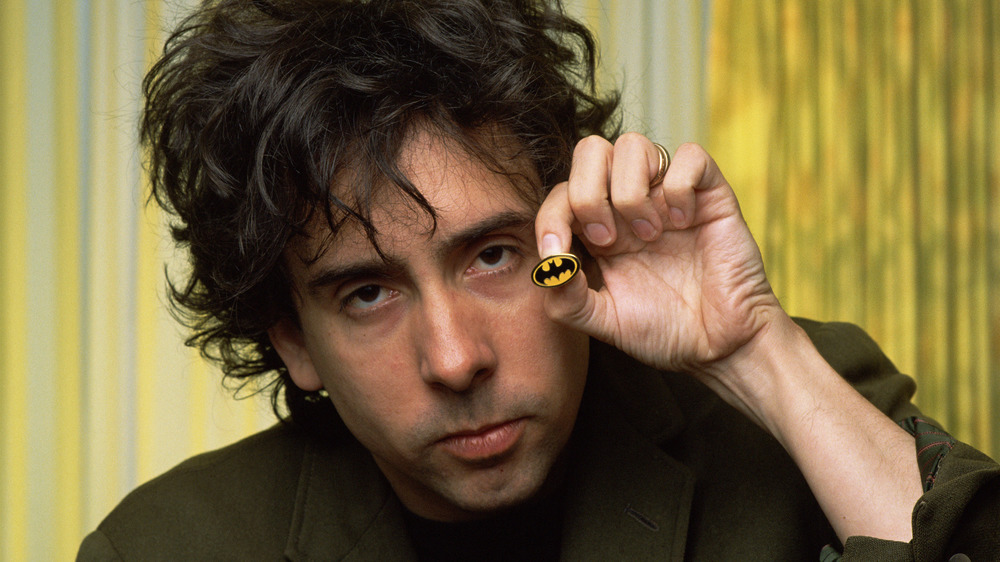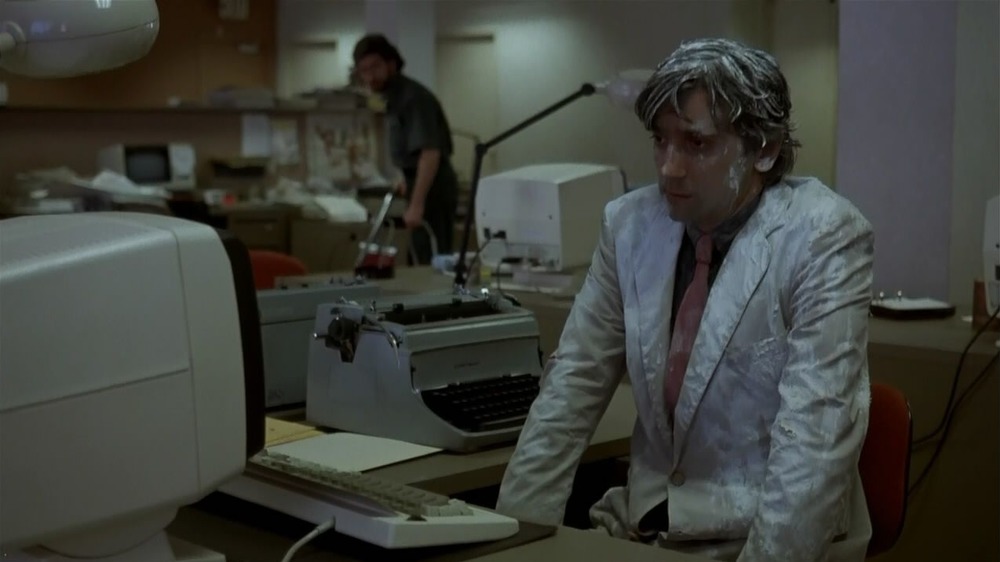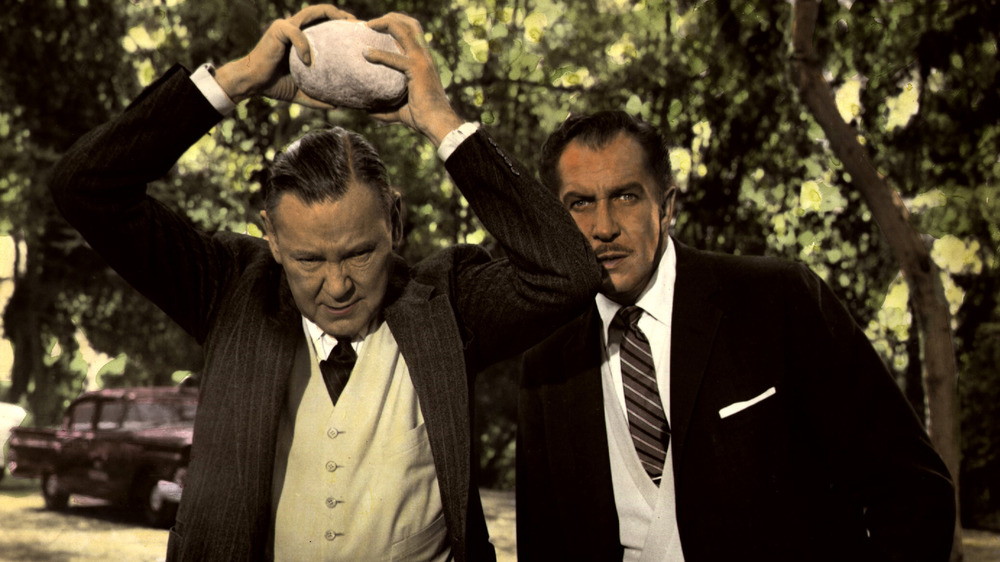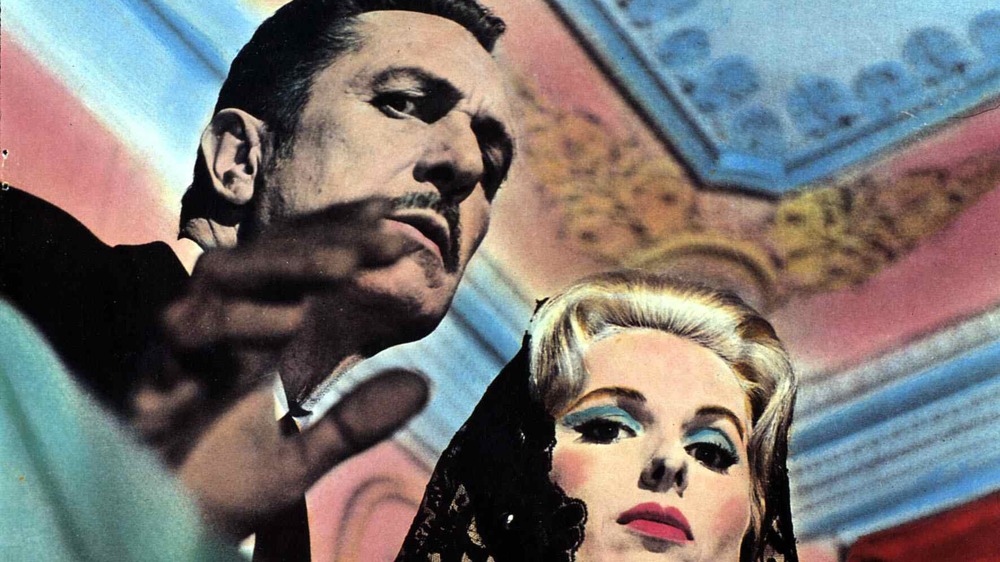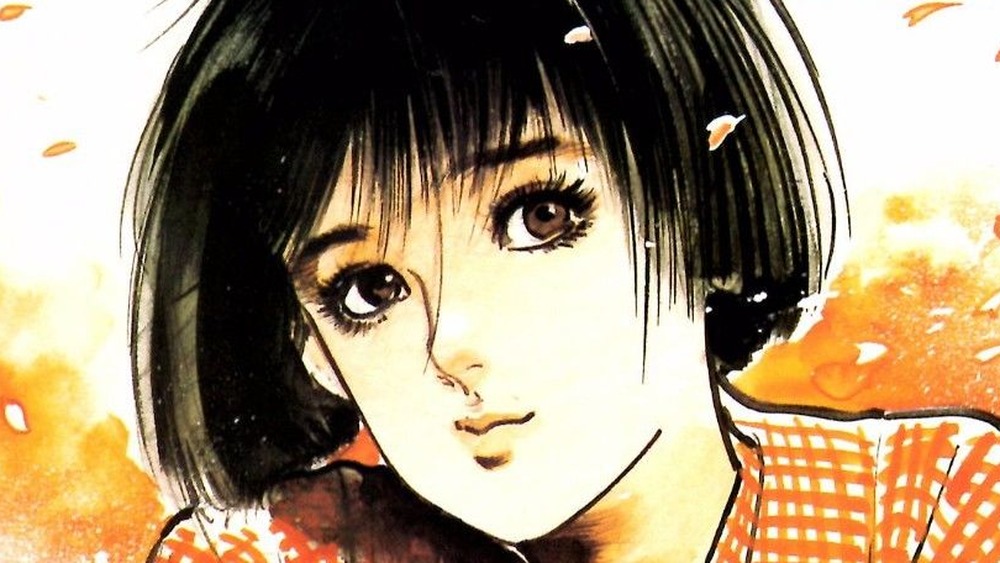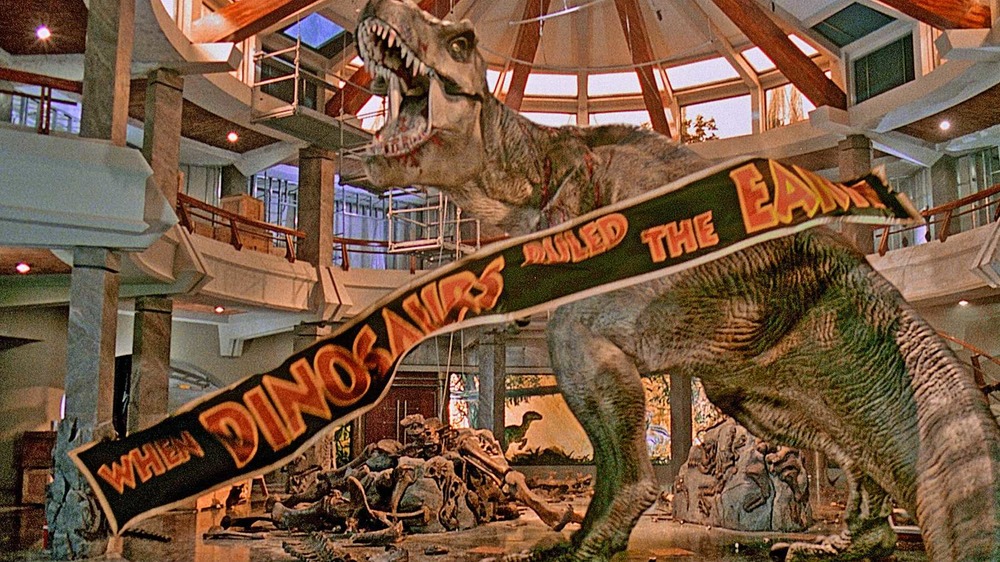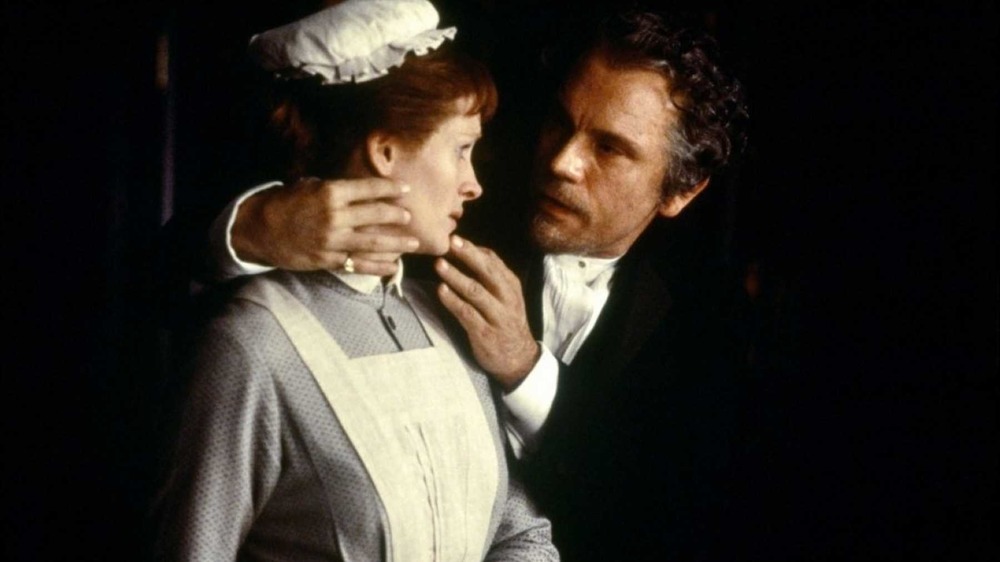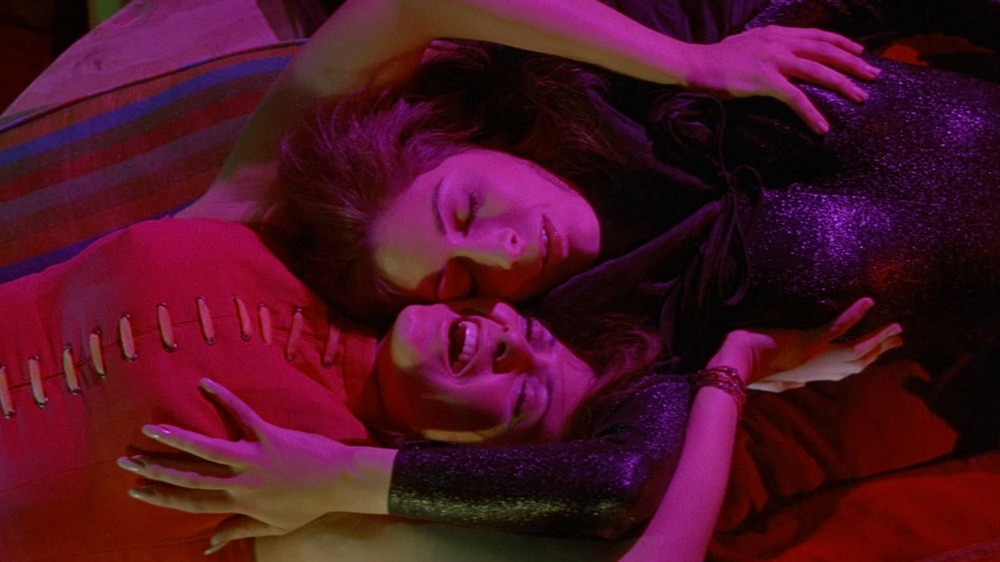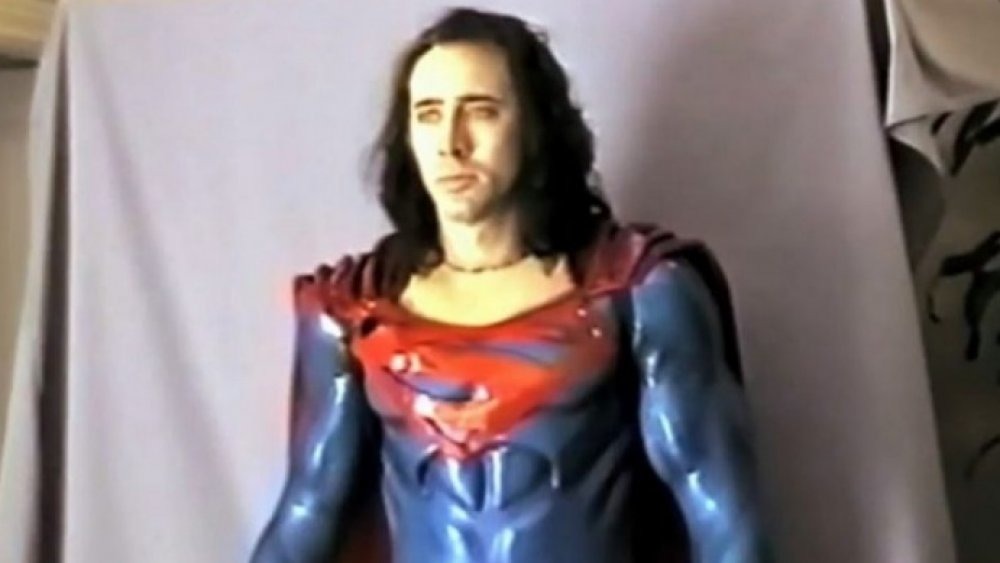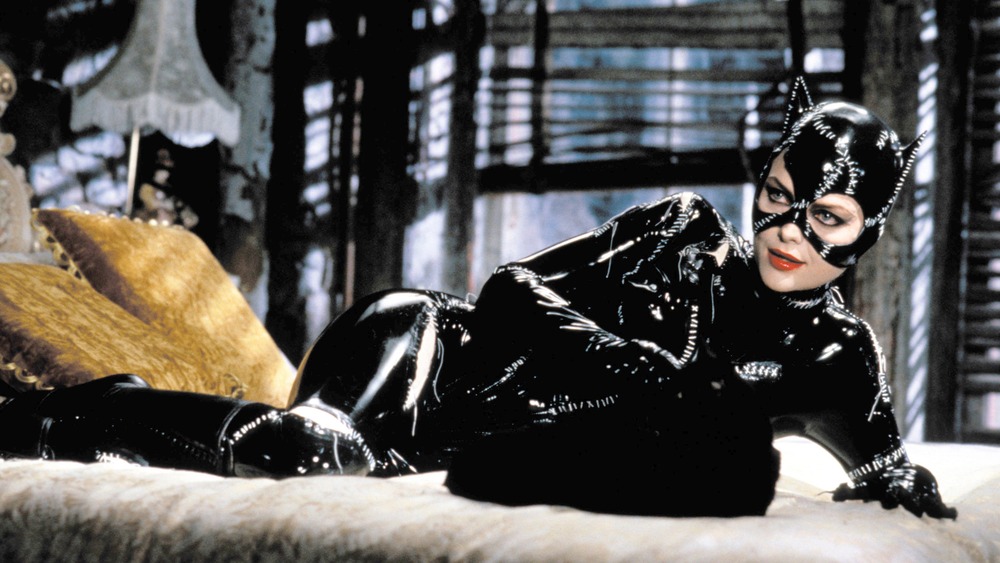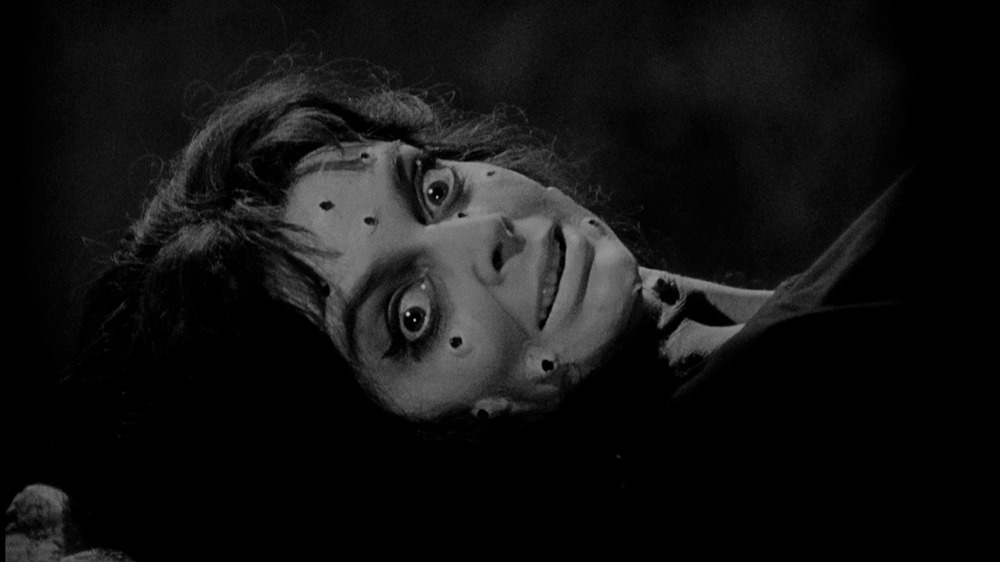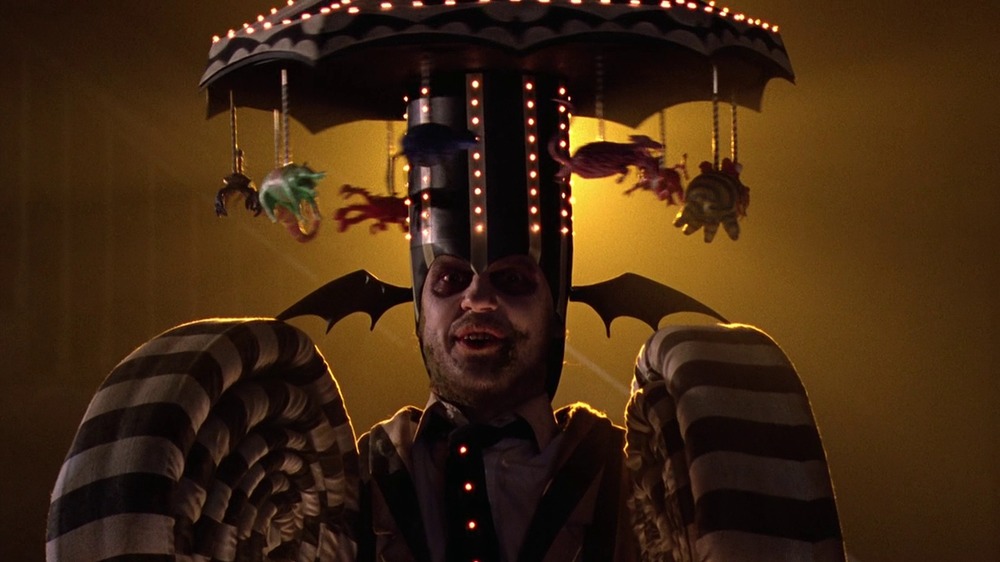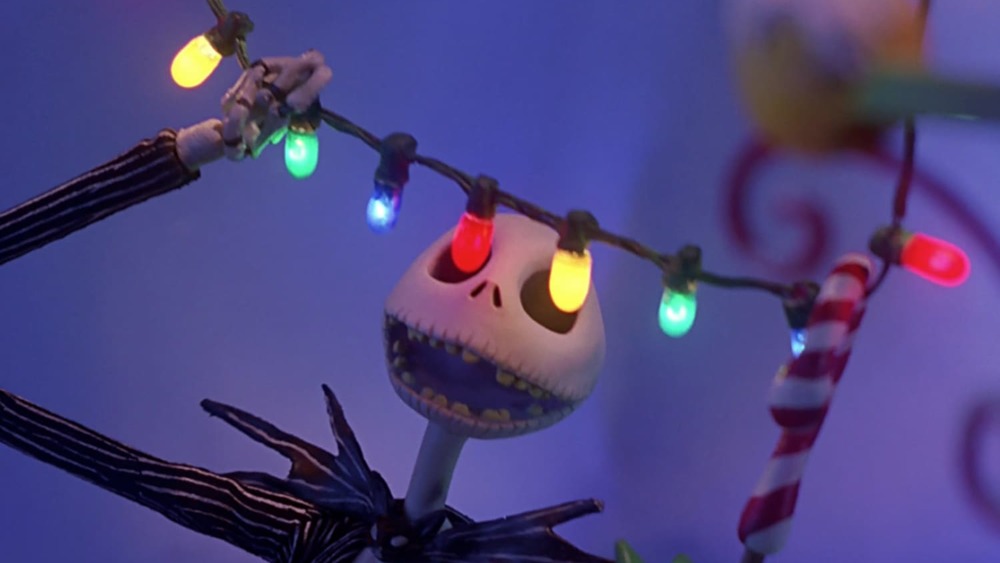Tim Burton Movies We'll Never Get To See
Tim Burton has one of the most recognizable and influential styles of any major filmmaker. He rose from his beginnings as an unsatisfied animator on the lowest rung of the Disney ladder to become one of the most profitable directors in Hollywood. Along the way, he's stamped his unique vision on blockbusters like Batman and Alice in Wonderland and cult classics like Edward Scissorhands and Pee-wee's Big Adventure, to say nothing of producing the dual-holiday favorite Tim Burton's The Nightmare Before Christmas, a film that's based on his story and sketches.
That vision has inspired his millions of fans to imagine what other movies might look like through Burton's unique, cracked lens. And some of those dreams came close to coming true, Like every filmmaker, Burton's career is full of might-have-beens. Some never got past a brief memo. Others came this close to a theater near you. But one way or another, they're all intriguing. From surreal comedies to superhero blockbusters, here are the Tim Burton movies we'll never see.
Tim Burton almost started his career with After Hours
In After Hours, the great director Martin Scorsese tells the story of a young everyman whose attempts to get with a girl he met in a diner descend into chaos one night in New York. However, Scorsese almost wasn't the one in the director's chair. In Filming for Your Life: Making After Hours, producer Amy Robinson recalls sending Scorsese the script, but he was busy trying to make The Last Temptation of Christ. And that's where Burton comes in. Robinson was so impressed with Burton's stop-motion short film Vincent that she offered him the script as his feature debut.
But then, The Last Temptation of Christ collapsed, freeing Scorsese up to make After Hours after all. Producer/star Griffin Dunne recalls offhandedly mentioning the news to Burton and says he responded, "Wait a minute — did you say Martin Scorsese wants to do this movie? ... I do not want to stand in the way of anything Martin Scorsese wants to do."
Instead, Burton would debut with Pee-wee's Big Adventure. But it's hard not to wonder how different his career could've been if he'd started with After Hours, instead. It's as dark and strange as anything Burton has actually made, but it's also far more adult than the family-friendly work Burton specializes in now, and it's at least a little more realistic. And it was made cheaply in the emerging world of independent filmmaking instead of the big studios that would turn Burton's vision into expensive spectacles. Would After Hours have changed him? Or would he have changed After Hours?
The Fly would've been a tribute to Tim Burton's heroes
As idiosyncratic as Burton's style is, it's also deeply rooted in his influences. And few have made a bigger impact on the director than the monster movies of his youth, the ones from producers like William Castle and Roger Corman. One of the most iconic of these movies is The Fly, featuring Burton's mentor Vincent Price, in which a scientist is transformed into an insectoid monster after a teleporter scrambles his atoms with a fly's. David Cronenberg remade The Fly in 1986, taking only the broad outline — Jeff Goldblum's Seth Brundle doesn't finish becoming a fly until the end — as a framework to continue his career-long exploration of the human body and its potential for horror as it changes against the protagonist's will.
It seems likely Tim Burton would've taken it in a totally different direction. He was actually the first choice for the project, possibly teaming up with his Beetlejuice/Batman star Michael Keaton. It's fun to imagine what Burton could've done in the playground of his childhood. And since he's created so many memorable bug-eyed monsters, imagine what he could've done with one that literally has a bug's eyes! This wasn't the last chance he turned down to resurrect a mid-century B-horror, either. He also contemplated remaking the Corman classic X: The Man with X-Ray Eyes.
Hours of interviews were lost in Conversations with Vincent
Many of the movies that inspired Tim Burton starred Vincent Price, who was instrumental in kickstarting the director's career at the end of his own. The legendary horror star had played in classics like House of Wax, The Masque of the Red Death, and House on Haunted Hill, and in the early 1980s, he lent his voice to Burton's first short film, Vincent, a story about a little boy who wants to be just like Vincent Price.
The two maintained a long friendship that continued through Price's appearance as "the Scientist" in Edward Scissorhands. That collaboration inspired Burton to turn their conversations into a documentary, but Burton's packed production schedule on Batman Returns and Price's death in 1993 held up his plans. Rumors of a direct-to-video version, renamed A Visit with Vincent, resurfaced the following year, but nothing came of them. Burton has called this one of his greatest regrets and blamed the delays on his inability to find funding. While we may never see the footage of Price and Burton in real life, Burton drew on it for Ed Wood, using his own experience to fictionalize the relationship between the "world's worst director" and horror legend Bela Lugosi.
Burton almost teamed up with Sparks for a manga musical
Mai the Psychic Girl would've combined three very different flavors of weirdness into something even stranger than the sum of its parts. In addition to Burton, it would've been based on the manga by Kazuya Kudo and Ryoichi Ikegami about an ordinary schoolgirl whose psychic powers attract the attention of a shadowy conspiracy called the Wisdom Alliance. Plus, it would've showcased songs by New Wave weirdo Sparks, the group that's been wowing adventurous listeners with their odd melodies and high-pitched vocals in alternatives hits like "This Town Ain't Big Enough for the Both of Us" and "The Number One Song in Heaven" since the '70s.
Sparks had been trying to get an adaptation off the ground since the '80s, and they sought out Burton almost immediately. Sadly, we never got to see this mad musical, but the movie's resurfaced multiple times since then, once as recently as 2010. But so far, nothing's come of it. At least not on film — some of Sparks' songs for the project have appeared online. It still has potential, though. The last time Burton teamed up with a New Wave musician, it resulted in his lifelong collaboration with Oingo Boingo frontman Danny Elfman, who's scored nearly every film he's made since Pee-wee's Big Adventure.
Burton could've been let loose in Jurassic Park
Jurassic Park was one of the defining movies of the '90s and of director Steven Spielberg's legendary career. Its story of a theme park exhibiting dinosaur clones, with predictably bloody results, and it's so memorable that you probably don't need us to repeat the details here. But believe it or not, after steering the Batman franchise to blockbuster success, Burton almost got the reins of this one, too.
Every studio in Hollywood wanted to get their hands on Michael Crichton's original novel, and that included Burton's Batman collaborators at Warner Bros., who bid on the book with the intention of handing it over to him. Crichton went for Spielberg and Universal, instead. Most Burton fans probably wouldn't prefer to live in a world without Spielberg's Jurassic Park, but the prospect of a version with bug-eyed, neon-colored, stop-motion dinos is still mighty tempting.
Those of us who'd rather have both versions of Jurassic Park nearly got our wish when Burton contemplated adapting the Dinosaurs Attack! trading card series. But Jurassic Park kiboshed that movie, too, since Burton didn't want to compete with Spielberg's spectacular effects or the upcoming Lost World. Instead, he opted to adapt the companion series Mars Attacks! — a decision that backfired spectacularly when the film got clobbered at the box office by the more conventional alien-invasion thriller Independence Day.
Mary Reilly would've given Burton a shot at one of horror's greatest icons
The classic movie monsters — Dracula, Frankenstein, and the rest — cast a long shadow over Burton's movies. And at one point, Burton had the chance to work with one of the scariest of them all. Mary Reilly adapted Valerie Martin's novel, which reinvented Robert Louis Stevenson's classic The Strange Case of Dr. Jekyll and Mr. Hyde as a Gothic romance between Dr. Jekyll and the title character. Burton spent almost two years developing his own take on the tale for Sony. But he quit in protest of the studio's treatment of his passion project, Ed Wood, which he felt Sony had been "jerking him around" on to ensure his commitment to Mary Reilly.
If that's true, their plan backfired, and Mary Reilly ended up in the hands of High Fidelity/Philomena director Stephen Frears. The movie premiered in 1996, with Julia Roberts and John Malkovich as Mary and Dr. Jekyll. The box office and reviews were not kind. Maybe Sony would've been better off with Burton, as most critics agreed the Mary Reilly we got was too subtle and respectable for its own good, and that's certainly never been Burton's problem.
Go, Baby, Go would've put the 50s in a blender
Before deciding to collaborate with screenwriter Jonathan Gems on Mars Attacks!, Tim Burton sorted through a whole pile of the writer's scripts. One of them must've been especially appealing to Burton, combining his beloved sci-fi B-movies with other bits and pieces of the American culture of his youth, from beach party movies to the softcore erotica of director Russ Meyer. Called Go, Baby, Go, the script told the story of three go-go dancers who, thanks to an experiment gone wrong, grow 300 feet tall and rampage across the beaches.
Unfortunately, HBO's remake of Attack of the 50-Foot Tall Woman beat Burton to market, so we'll never get to see just what Go, Baby, Go might've looked like. The sunny California setting certainly would've been a welcome change from Burton's usual Gothic gloom. And despite the sleazy world he worked in, Russ Meyer is a brilliant and acclaimed filmmaker whose influence could've brought out the best in Burton. Meyer snuck in a wicked sense of humor and experimental editing tricks in between the T&A, and he has a surprising pedigree. One of his movies, Beyond the Valley of the Dolls, was even written by the legendary critic Roger Ebert! Mixing Meyer's films with the completely different world of B-horror and beach party movies, Go, Baby, Go could've been an extremely heady stew and something totally new from a director who, in 1994, was already starting to repeat himself.
Superman Lives died in development
Out of all these possibilities, there's no bigger might-have-been in Burton's career than Superman Lives. It spent years in production, all the while churning out reams of drool-worthy concept art, multiple screenplays, and even several completed sets and costumes. From what we know, it would've either been very, very good or very, very bad — but it certainly wouldn't have been boring.
Inspired by the then-recent success of the Death of Superman comics, it would've pit Superman against the alien collector Brainiac, who travels to Earth in a skull-shaped ship full of bizarre, captured critters. Burton radically reinvented the classic supervillain as a disembodied head on long, spiderlike metal legs.
Superman would've also been very different. Just as he did with Batman, Burton found the sadness and alienation behind the all-American hero — literally, in this case, as an alien living on Earth. Superman would've been played by Nicolas Cage, one of the most convincingly alien performers out there. And with Christopher Walken up for the role of Brainiac, it would've been weirdo-to-weirdo combat at a level we've never seen. Unfortunately, it wasn't meant to be. After a year of getting micromanaged to death by an army of producers, the project fell apart when Warner Bros. panicked after a series of bombs.
Catwoman would've turned superheroes upside down
After the success of his Batman films, Burton decided to look at another comic book adaptation, this one a direct spinoff with Michelle Pfeiffer's Catwoman. It's less obvious now that we've seen every permutation of the superhero genre on the big and small screens, but those movies were incredibly iconoclastic in their time. They took Batman — who, in the popular imagination, was still associated with the goofy, peppy TV series — and turned him into the grim avenger we know today for the first time outside the comics. And Catwoman would've gone even further.
Here's how screenwriter Daniel Waters describes his draft (via Den of Geek): "What Gotham City is to New York City, Oasisburg is to Las Vegas-Los Angeles-Palm Springs. [It's a] resort area in the middle of the desert. It's run by superheroes, and the movie has great fun at making fun at the whole male superhero mythos." But after the backlash to the sex and violence of Batman Returns (including, among other things, the Penguin biting a man's nose off and Pfeiffer wearing a suit so tight that she had to be vacuum-sealed inside it), Warner Bros. wanted to take the franchise in a more kid-friendly, merchandisable direction. Catwoman eventually reached the screen in a very different form, starring Halle Berry, without a superhero-run spa in sight. But given how universally hated that movie was, maybe it's better if we move on.
Black Sunday would've given Tim Burton a chance to remake a personal favorite
The Italian director Mario Bava is one of the masters of horror and one of Burton's personal role models. Bava's most beloved movie, Black Sunday, loosely adapts the Nikolai Gogol novel Viy to tell the story of a witch who returns from the grave and tries to regain her full power by possessing her own descendant (both characters are played by Barbara Steele). It has everything you could want from a Burton film — over-the-top violence, dreamlike Gothic atmosphere, an ethereal, pop-eyed star, and unreal, stagy sets. And even though it's black and white, it's hard to imagine Burton would be able to resist paying tribute to the lurid colors of Bava's later movies and his followers in the giallo genre, which were often lit with brightly colored stage lights. After all, he's been doing that all through his career.
Burton's Black Sunday never made it to theaters, but we can still see some glimpses of it in the Burton flicks that did, especially his take on Sleepy Hollow. He's made no secret he had Bava on the brain in this film, which serves as a tribute to him and other horror filmmakers of the '60s. Along with a similar plot about centuries-old witches cursing the descendant of their persecutors, it also includes a direct recreation of Black Sunday's iconic image of the witch pierced by a spiked iron mask when young Ichabod Crane discovers his mother in his father's iron maiden.
Could Beetlejuice have gone Hawaiian?
Pee-wee's Big Adventure announced Tim Burton's arrival in the world of feature directing, but his follow-up with Beetlejuice was the blockbuster that rocketed him to stardom. Its success has haunted Burton throughout his career, not least with the demands for a sequel that have followed him every step of the way.
Rumors first surfaced in 1990, when Burton and writer Jonathan Gems were attached to a script with the eyebrow-raising title of Beetlejuice Goes Hawaiian. This outlandish concept has convinced many writers the whole thing was a prank, especially since Gems said, "Tim thought it would be funny to match the surfing backdrop of a beach movie with some sort of German Expressionism, because they're totally wrong together." But knowing how Burton's strange mind works, that might've genuinely inspired him. Does this mean Beetlejuice wins a surfing contest and meets ancient island spirits straight out of Disneyland's Enchanted Tiki Room? You better believe it does!
Nothing happened in 1990, but Beetlejuice Goes Hawaiian has kept popping up ever since. Kevin Smith — who also wrote a draft of Burton's Superman Lives — was hired to rewrite it fresh off his success with Clerks. (He declined, saying, "Didn't we say all we needed to say in the first Beetlejuice? Must we go tropical?") And Pride and Prejudice and Zombies author and frequent Burton collaborator Seth Grahame-Smith announced as recently as 2011 that the project was finally going to happen — but as of now, we're still waiting.
Artistic integrity prevented The Nightmare Before Christmas 2
It's hard to believe now that it's a bona fide pop culture phenomenon — if not one of the biggest in recent memory — but A Nightmare Before Christmas flew under the radar when it came out in 1993. Disney didn't even want their name on it, releasing it instead under the adult-oriented Touchstone banner. But they changed their tune as the fandom continued growing in the decades since its premiere, and the studio approached both producer/creator Burton and director Henry Selick about bringing Jack back.
But neither of them were happy with Disney's conditions, and one demand in particular killed the deal. The Nightmare Before Christmas took off so far in large part because of its stop-motion animation, which gave it a handmade, personal charm and a subtly uncanny atmosphere. Disney didn't seem too clear on the concept. Selick says they insisted the sequel had to be updated with CGI. Burton was even less open to the idea, saying, "I was always very protective of [the movie], not to do sequels or things of that kind. You know, 'Jack visits Thanksgiving world' or other kinds of things, just because I felt the movie had a purity to it and the people that like it. Because it's not a mass-market kind of thing, it was important to kind of keep that purity of it." Fortunately, Burton did make many other movies, and many of them never lost that purity.
